

Children of today are better at delaying gratification than previous generations. How US kids’ problems with fractions reveal the fascinating link between language and maths. By guest blogger David Robson Cast your mind back to your teenage maths lessons.
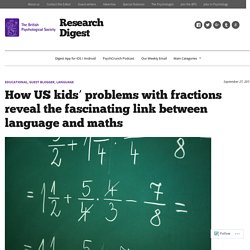
A classic finding about newborn babies’ imitation skills is probably wrong – Research Digest. Even a four-year-old can tell when you’re contradicting yourself (and now they won’t trust you) – Research Digest. “Yes Victoria, eating chocolate is unhealthy, but not when I eat it” – you might wonder just how long you can get away this kind of contradictory logic with your kids.
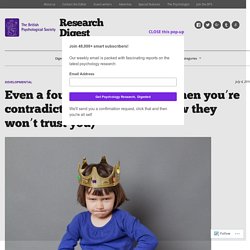
If you’d asked Jean Piaget, one of the founding fathers of child psychology, he would probably have told you that you’ll be fine until they’re at least eight. The rise and fall of cognitive skills. Scientists have long known that our ability to think quickly and recall information, also known as fluid intelligence, peaks around age 20 and then begins a slow decline.
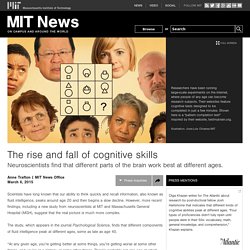
However, more recent findings, including a new study from neuroscientists at MIT and Massachusetts General Hospital (MGH), suggest that the real picture is much more complex. The study, which appears in the journal Psychological Science, finds that different components of fluid intelligence peak at different ages, some as late as age 40. Proc Nat Inst Sci: Calvin and Hobbes. September 12, 2014 Matt J.
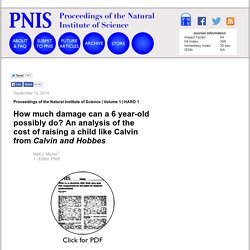
Human cognition-affecting virus discovered. Researchers at the John Hopkins Medical School and the University of Nebraska have discovered a virus that infects our brains and "makes us more stupid.

" In a study published in the Proceedings of the National Academy of Sciences (PNAS) journal, researchers describe coming across the virus by chance, while conducting a different study altogether into throat microbes. Throughout the research, it was found that the DNA in the throats of healthy individuals matched the DNA of a virus (ACTV-1), which usually infects green algae. The algae virus, which was discovered by these researchers, was previously thought to be harmless to humans. Readers absorb less on Kindles than on paper, study finds. The whole truth. Children learn a great deal about the world from their own exploration, but they also rely on what adults tell them.

Studies have shown that children can figure out when someone is lying to them, but cognitive scientists from MIT recently tackled a subtler question: Can children tell when adults are telling them the truth, but not the whole truth? Led by Laura Schulz, the Class of 1943 Career Development Associate Professor of Cognitive Science, the researchers found that not only can children make this distinction, but they can also compensate for incomplete information by exploring more on their own. Determining whom to trust is an important skill to learn at an early age because so much of our knowledge about the world comes from other people, says Hyowon Gweon, an MIT postdoc and lead author of a paper describing the findings in the journal Cognition. Cool Kids Lose, Though It May Take A Few Years. Hide captionAs Lindsay Lohan's character (far left) learned in the movie Mean Girls, popularity comes at a price.

The Kobal Collection As Lindsay Lohan's character (far left) learned in the movie Mean Girls, popularity comes at a price. Parents, teachers and cheesy after-school specials have long tried to convince kids that being cool and popular isn't all that it's cracked up to be. Now scientists are chiming in as well. Dating, flouting authority and surrounding yourself with good-looking friends may make you popular when you're 13, according to a study published online Wednesday. The Power (and Peril) of Praising Your Kids. What do we make of a boy like Thomas?
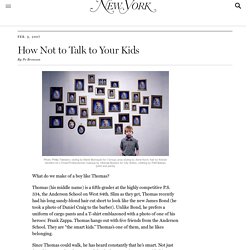
Thomas (his middle name) is a fifth-grader at the highly competitive P.S. 334, the Anderson School on West 84th. Introducing the SuperAgers - the elderly people whose brains have stayed young. They say the slow inevitable decline sets in during our early twenties.

Like a rocket reaching its apogee, once the brain is fully developed there is the briefest lull, and then it's all downhill, the last neural areas to develop being the first to start unravelling. By the time of old age, so certain are the impairments in mental processing that psychological tests are age-adjusted - "You're slow Bob, but not for your age. The Truth About the Effect of Pregnancy on Women's Brains. Be careful when comforting struggling students. If We Feel Too Busy, It's Probably Due to Too Much Free Time: Scientific American Podcast. Objectively time is constant.

A minute is a minute. But when we have a lot to do, it usually feels like we have less time. Now a study finds an interesting wrinkle in time: when we busy ourselves with selfless tasks, time seems to expand. The work will be published the journal Psychological Science. Guitar Zero: A Neuroscientist Debunks the Myth of "Music Instinct" Genes for Intelligence - Back to Square One. Here's a paper - soon to appear in Psychological Science - which says that Most Reported Genetic Associations with General Intelligence Are Probably False Positives. Hearing about scientists' struggles helps inspire students and boosts their learning. Science suffers from an image problem.
Out-of-body experience: Master of illusion. N. What Does Your Web Browser Say About Your I.Q.? (Hint: I.E. Users Won’t Like the Answer) The first ever experimental investigation of laughing at oneself. When four is not four, but rather two plus two. When it comes to working memory, the brain’s mental sketchpad, studies have largely converged on four as the magic number: It’s how many objects average adults can successfully hold in mind at once. NERS Review of the year Part 5 – Best mind hacks. Body Under General Anesthesia Tracks Closer to Coma than Sleep. Patients undergoing significant operations, such as major cardiac or transplant surgery, typically require general anesthesia.
But putting patients to "sleep" might not be the best way to describe the process, argued the authors of a new review paper, published in the December 30 issue of the New England Journal of Medicine. How long is a severed head conscious for? Why Do People Confess to Crimes They Didn’t Commit? The Way We Live Now - Living to Be a Parent. The Memory Doctor. - By William Saletan. Blog Archive » …A Toast to the Host with the Least Cognitive Decline! Neuroscience Cases: The Man Who Could Not Forget « B Good Science Blog. Children in formal child care have better language skills. Tool Use and Extended Mind - The Post-Cognitivist Blog.